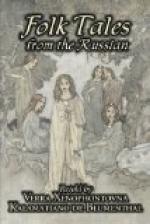The Frost kept crackling and asking questions for quite a while, but obtaining no polite answer became angry and froze the girl to death.
“Old man, go for my daughter; take the best horses; be careful; do not upset the sleigh; do not lose the trunk.”
And the little dog in the corner said:
“Bow-wow! bow-wow! the old man’s daughter will marry soon; the old woman’s daughter shall be buried soon.”
“Do not lie. Here is a cake; eat it and say, ’The old woman’s daughter is clad in silver and gold.’”
The gate opened, the old woman ran out and kissed the stiff frozen lips of her daughter. She wept and wept, but there was no help, and she understood at last that through her own wickedness and envy her child had perished.
[Illustration: THE END]
[Illustration]
NOTES
The Tsarevna Frog
A tsarstvo is the domain of a tsar (czar), which is the title of an absolute monarch in Russia. The word tsar, derived from the Roman name and title, Caesar, may be translated emperor, king, or prince. A number of words are formed from it by adding different syllables: Tsarevitch, the tsar’s son, prince; Tsarevna, the tsar’s daughter, princess; Tsaritza, the tsar’s wife, queen or empress.
Boyar was the word formerly used to mean a Russian nobleman; so a boyar-house is a lord’s house; boyarishnia, a lord’s daughter. The terem was that part of the boyar-house in which the women’s rooms were situated.
In Russia there is a fatherly relation existing between the ruler and his subjects which is shown in such phrases as “the tsar father,” “their father sovereign,” etc. The Russian language has many diminutives, or terms of endearment. For instance, the Tzar is often affectionately called “the little father” by his subjects.
“Once said, quickly done.” This is the Russian idiom. Observe how much more lively it is than our own “No sooner said than done.”
Seven Simeons
The holy icons are pictures or mosaics of Christ, or the Virgin Mary, or of some saint or martyr of the Russian church. In every Russian house there is one or more, hung in a prominent place. Every one who enters the house at once bows and utters a prayer before the icons before he does anything else. This is an old Russian custom which is still kept up by peasants.
Strong green wine. This is the phrase still used by Russian story-tellers to describe the drink which it was an honor to receive from the royal hand. Its strength was magical in that it was not acquired by keeping, but was always the same.
For a cloudy day is the Russian idiom very similar to our own.
It is a peasant’s trade is a Russian saying which means, “It doesn’t amount to much.”




